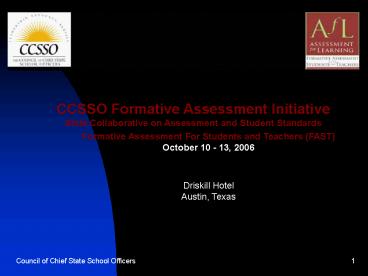CCSSO Formative Assessment Initiative - PowerPoint PPT Presentation
1 / 18
Title:
CCSSO Formative Assessment Initiative
Description:
State Collaborative on Assessment and Student Standards ... Learning progressions or trajectories. Individual learning. Self-director learning. Peer learning ... – PowerPoint PPT presentation
Number of Views:55
Avg rating:3.0/5.0
Title: CCSSO Formative Assessment Initiative
1
CCSSO Formative Assessment Initiative State
Collaborative on Assessment and Student Standards
Formative Assessment For Students and Teachers
(FAST) October 10 - 13, 2006
Driskill Hotel Austin, Texas
2
Why focus on formative assessment?
- The intent of initiative is on transforming
learning and teaching for the 21st century - Classroom-based formative assessment is a
powerful concept and research-based practice for
deep engagement of learning by and for students
and teachers. - Learning progressions or trajectories
- Individual learning
- Self-director learning
- Peer learning
3
Why focus on formative assessment?
- This practice of formative assessment is what is
supported by research - Student learning and achievement
- Motivation and confidence,
- Habits of learning
4
Why focus on formative assessment?
- But not focus only here, extend to vision and
implementation of balanced assessment system - Balance
- Formative and summative purposes of assessment
- From classroom to state levels
- Different users and information needs
5
Why focus on formative assessment?
- All levels of assessments working together to
full embodiment (Shepard) of learning standards - Going beyond alignment
- Toward a higher level of accountability of all
stakeholders students, teachers, parents,
leaders, and policymakers
6
Why focus on formative assessment?
- Systemic Validity
- Where formative assessment can enhance the
validity, reliability, and effectiveness of all
assessments as mutually-reinforcing and linked to
state standards, with differing roles and impacts
in improving instruction and student achievement,
as well as teacher efficacy.
7
Why focus on formative assessment?
- Critical relationship between assessment and
instruction in terms of a feedback loop - Classroom formative assessment continuously
adapting instruction to better meet student
needs. - Large scale assessment this relationship is weak,
at least in terms of decision making at the
individual level. - In every school and in the public at large, there
are numerous inferences being made about
teaching, learning and curriculum based on large
scale assessment data.
8
Why focus on formative assessment?
- Formative assessment data can contribute to the
system validity by strengthening the decisions
made about students, learning, and teaching
strategies. - A balanced assessment system integrates different
kinds and levels (i.e., classroom, district, and
state) of assessment data and, thereby, enhances
the overall quality, validity, and reliability of
the interpretations and decisions based on that
data
9
Why focus on formative assessment?
- A comprehensive and systemic approach to
learning integrating standards, curriculum,
instruction, assessment, teacher education and
professional development - This is the appropriate role of assessment in
Standards-Based Reform (SBR)
10
Setting the Context Work Completed to Date
- Submitted mid-June 2006. Received approval
confirmation in early October. - Enhanced Assessment Grant Implementing and
Improving Balanced Assessment Systems for High
School Success and Beyond - Purpose of grant To enhance the quality of
assessment instruments and systems used by States
for measuring the achievement of all students. - Delaware, Arizona, Connecticut, Iowa, Louisiana,
Maine, Michigan, Nebraska, New Mexico, Virginia
11
Setting the Context Work Completed to Date
- CCSSO, the ETS/Assessment Training Institute, the
University of Pennsylvanias Consortium for
Policy Research in Education (CPRE), and Edvantia - Capacity building project to provide intensive
professional development for state, district and
high school teams in the effective implementation
and improvement of a comprehensive and balanced
learning and assessment system. - Ted Sizer The American H.S. is where the
relatively young go to watch the relatively old
perform. - Project has 4 goals
- Begin with a self-examination of each states
assessment program and how to design and
integrate high-quality formative assessments into
a comprehensive and balanced assessment system.
12
Setting the Context Work Completed to Date
- Project has 4 goals
- Begin with a self-examination of each states
assessment program and how to design and
integrate high-quality formative assessments into
a comprehensive and balanced assessment system.
13
Setting the Context Work Completed to Date
- Build state leadership capacity and support state
technical assistance to districts and high
schools in providing high-quality professional
and leadership development in balanced assessment
systems and specific practices of assessment for
learning.
14
Setting the Context Work Completed to Date
- Begin using district and high school teams to
implement the vision and assessment for learning
in schools and classrooms.
15
Setting the Context Work Completed to Date
- Generate and disseminate tools, techniques, and
new knowledge to support future approaches to
teaching and learning, while strengthening the
commitment to all students learning at higher
levels.
16
Setting the Context Work Completed to Date
- EAG continued
- Immediate Timeline
- Training for state and local teams will start in
November and continue thru the winter.
17
Setting the Context Work Completed to Date
- EAG continued
- Local district and high school teams will begin
to operationalize this vision during spring 2007,
with CPRE documenting the challenges and
activities at this initial stage of
implementation as part of the formative
evaluation component of this project. - Project concludes in spring 2008 with a final
CPRE evaluation that will look at the team based
learning process and an assessment of the impact
of the project on state assessment practices,
school practices and district policies, and
whether the project is worthy of replication.
18
Setting the Context Work Completed to Date
- EAG continued
- Connectivity of ideas between the EAG grantees
and the FAST SCASS. - Many of the same states are involved in both
initiatives. - Cross fertilization of FAST SCASS and other SCASS
projects such as TILSA. - Adoption of the FA definition.































